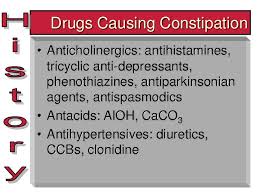As if everyday life didn’t bring enough challenges when battling constipation!! If you take these drugs, and the list is probably longer, it could be causing constipation
There are several medications that may cause or aggravate constipation. Prescription drugs that cause constipation include pain relievers like opiates etc.
Agents that cause constipation especially among the elderly include:-
Opoid pain relievers like Morphine, Codeine etc.
Anti-cholinergic agents like Atropine, Trihexiphenidyl
Antispasmodics like dicyclomine
Tricyclic antidepressants like amytriptyline
Calcium channel blockers used in arrhythmias and high blood pressure such as verapamil
Anti-Parkinsonian drugs – Parkinson’s disease itself may cause constipation and the drugs used for this condition including Levodopa cause constipation as well
Sympathomimetics like ephedrine and terbutaline. Terbutaline is commonly used on bronchial asthma
Antipsychotics like clozapine, thioridazine, chlorpromazine used for psychiatric disorders
Diuretics for heart failure like furosemide
High blood pressure lowering agents like methyldopa, clonidine, propranolol etc.
Antihistamines like diphenhydramine
Antacids especially calcium and aluminium containing
Calcium supplements
Iron supplements
Antidiarrheal agents (loperamide, attapulgite)
Anticonvulsants e.g. phenytoin, clonazepam
Pain relievers or NSAIDs (Non steroidal anti-inflammatory drugs) like ibuprofen, aspirin etc.
Miscellaneous compounds including Octreotide, polystyrene resins, cholestyramine (for lowering high blood cholesterol) and oral contraceptives
There are several non-prescription agents that may cause constipation. Taking several medicines that can cause constipation and taking large doses of these medicines increases the risk of constipation.
The patient is encouraged to reveal all the non prescription as well as herbal and alternative medications that he or she is taking along with the prescribed medication. This helps determine the agents that may cause constipation.
Constipation is the most common side effect of taking opioids regularly for pain. Patients who are using opioids for arthritis or severe cancer pain may have no alternative. They may be treated for constipation with drugs. Patients are encouraged to take more fluids and adequate fibers in diet.
A common goal for patients with constipation is to have one bowel movement every 1 to 2 days.
Warning signs
Warning signs in constipation include:-
Blood in stools
Vomiting, or abdominal cramps lasting more than 2 hours
No bowel movements for 4 or more days
Unexpected weight loss
Loss of appetite
Drinking fluids
Patients are advised to drink 8 glasses of fluids every day. The fluids however should be regulated in patients with kidney disease or heart failure.
The patient is encouraged to drink a glass of warm or hot liquid about 30 minutes before the normal time for a bowel movement.
Regular physical activity and eating a healthy and balanced diet also helps prevent constipation in patients on long term constipation causing medications.
Source: Dr. Ananya Mandal, MD
Reviewed by April Cashin-Garbutt, MA (Editor)
Sources
http://www.practicalgastro.com/…/M…/PG_May08ToneyArticle.pdf
www.med.umich.edu/bowelcontrol/…/teaching/umconstipation.pdf
www.gastro.org/…/AGAPatientBrochure_Constipation.pdf
provider.ghc.org/…/constipationMedicine.pdf
http://jppr.shpa.org.au/lib/pdf/gt/ratnaike200010.pdf
www.nhs.uk/…/CausesofconstipationCRUK3pages.pdf







